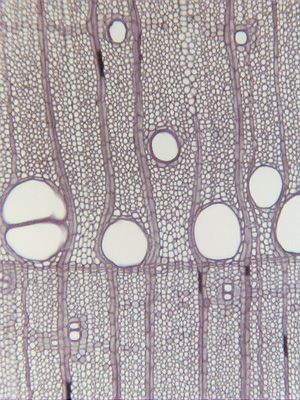 Fig.
15.3-3. Transverse section of wood of ash (Fraxinus). Whereas
the cells in conifer wood are deposited in regular radial rows, the rows of
cells in dicot wood are disrupted as the young vessel element precursor cells
swell to their full width, pushing neighboring cells apart. Here in this Fraxinus
wood, the
enlargement of the vessels has distorted even the rays. Remember that
each of these vessel elements started out as a cell just as small as the fiber
cells making up the bulk of the wood, so each underwent tremendous enlargement.
Despite being pushed around by the vessels, the ray cells undergo proper
morphogenesis and then function normally.
Fig.
15.3-3. Transverse section of wood of ash (Fraxinus). Whereas
the cells in conifer wood are deposited in regular radial rows, the rows of
cells in dicot wood are disrupted as the young vessel element precursor cells
swell to their full width, pushing neighboring cells apart. Here in this Fraxinus
wood, the
enlargement of the vessels has distorted even the rays. Remember that
each of these vessel elements started out as a cell just as small as the fiber
cells making up the bulk of the wood, so each underwent tremendous enlargement.
Despite being pushed around by the vessels, the ray cells undergo proper
morphogenesis and then function normally.
The very wide vessels are earlywood vessels, aligned at the boundary with the latewood of the previous year. This is a ring porous wood.